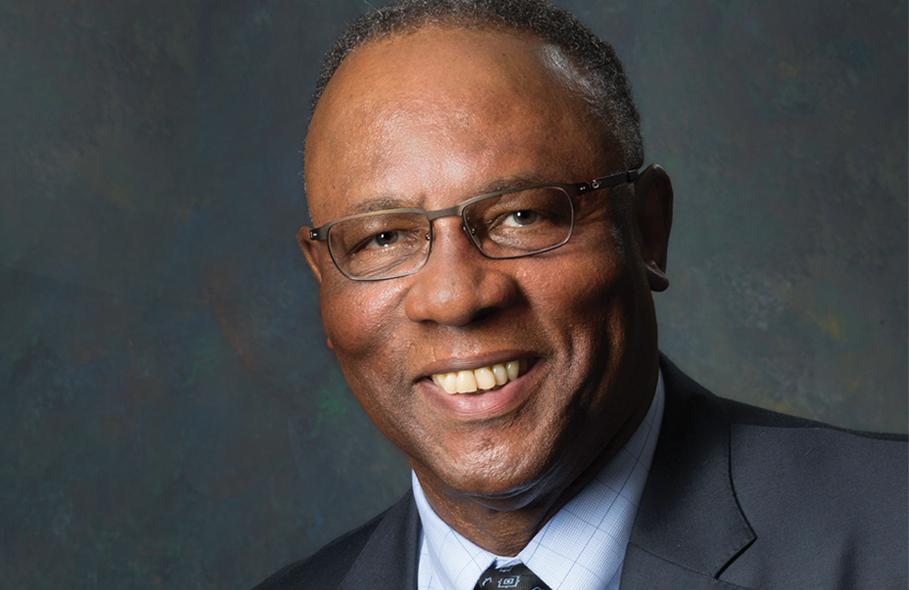Scholarship at the Intersection of History, Education, and Blackness
by LaMont Jones / Sep 20, 2018

College of Education Dean James D. Anderson is among a select group of education leaders featured in the “Academic Kickoff” issue of Diverse Issues in Higher Education. The September publication highlights important endowed scholars from colleges of education nationwide.
----------
Were it not for the social tumult in Chicago in the summer and fall of 1967, Dr. James D. Anderson likely would not have walked away from the joy of teaching high school social studies, found refuge in a Ph.D. program studying the history of education, and transitioned to a career in higher education.
Now, 45 years after being hooded at the University of Illinois at Urbana-Champaign, Anderson is one of the nation’s foremost scholars on the history of U.S. education as a specialist in the histories of public school desegregation and higher education desegregation and the history of African-American education in the South.
Anderson is dean of the College of Education and the Edward William and Jane Marr Gutgsell Professor of Education at the University of Illinois at Urbana-Champaign, where he also serves as a professor of history and an affiliate professor of law. He is a senior editor of Education Quarterly, has advised and participated in several PBS documentaries, and has been an expert witness in several federal desegregation and affirmative action cases.
Anderson says he couldn’t think of a more fitting year to be appointed to his endowed chair—2014, the 50th anniversary of the watershed Brown v. Board of Education decision in which the U.S. Supreme Court ruled that racial separation of public school students was unconstitutional. That’s because so much of his scholarship revolves around the intersection of history, education, and race.
“All teachers and administrators concerned with education should know the values and struggles fought by black people to get access to quality education,” says Anderson. “Sometimes people assume that black people maybe come from families that don’t place high value on education, but the truth is the opposite. Generation after generation, black parents fight for their kids to have quality education. It helps to know that context before going in the classroom and saying, ‘These kids aren’t interested.’
“If you know their traditions, you can call on their traditions and call upon what their ancestors tried to do. Talk to them about not giving up. I help them understand that their minds are as brilliant as minds anywhere else in the world. That sense of defeatism—that is the yoke round your neck.”
Bringing the best out of students was Anderson’s desire when he began his first job teaching high school social studies on the west side of Chicago. Armed with a bachelor’s degree in sociology from Stillman College, a master’s degree in history and social studies education from the University of Illinois at Urbana-Champaign, and teacher certification in secondary education, he quickly fell in love with teaching.
“I just had such a good relationship with the students,” he says. “I took to it like a fish to water.”
During his doctoral studies in the history of education at Illinois, Anderson found his way into the classroom as a teaching assistant.
“I really did fall in love with the profession,” Anderson says. “I feel blessed to have chosen this path.”
A native of Eutaw, Alabama, Anderson sees some of the same activism and passion for social justice among many of today’s students that was highly visible early in his career.
“You see it wane over the years” he says, “then, next thing you know, you see a flow after the ebb where students are active again, whether it’s Black Lives Matter or other kinds of issues, issues of free speech. They want a good education, but also a better society. They combine passion for achievement with issues of justice.”
Anderson is a man of achievement. Among his numerous honors are the American Educational Research Association’s (AERA) outstanding book award in 1990 for The Education of Blacks in the South, 1860-1935, election to the National Academy of Education in 2008, the Lifetime Achievement Award from the American Association of Colleges for Teacher Education in 2012, and selection as a Fellow for Outstanding Research by the AERA in 2012.
As another academic year begins, Anderson is preparing for what he says “is known as the second fountain”—two milestones in 2019 for Americans generally and African-Americans particularly. The year will mark the 150th anniversary of the 13th Amendment, which freed the slaves, and the 400th year since the arrival of the first of those African slaves on American shores.
“We have to think about how we honor and commemorate 400 years,” says Anderson. “What does that mean, and where are we after 400 years, and where are we going? At some points along the way, you stop and take stock of where you’ve been. This is a time for the nation and African-Americans together to take stock.”
This article appeared in the September 20, 2018, edition of Diverse Issues in Higher Education and is the first in a series of profiles about distinguished professors of education.